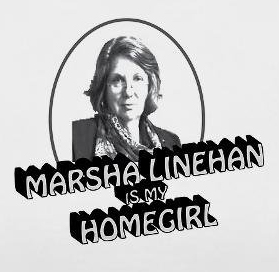University of Washington psychologist Marsha Linehan has a strict definition of her ground-breaking Dialectical Behavioral Therapy (DBT). If a client doesn’t …
- attend a DBT skills group and …
- receive individual therapy from a DBT-trained therapist …
- who attends a weekly DBT consultation group and …
- offers phone coaching,
… they aren’t really in DBT. The full program is what she researched; she won’t vouch for anything less. A new study by Van Dijk, Jeffrey and Katz of the Southlake Regional Health Centre in Ontario, Canada suggests even a cherry-picked form of ‘adherent’ DBT may still help those with Bipolar Disorder.
The researchers enrolled twenty-six adults with Bipolar I or II Disorder in a psychoeducational group. The clients learned about their diagnosis, but were also trained in mindfulness practice and DBT’s emotional-regulation, interpersonal-effectiveness and distress-tolerance skills. After twelve weeks of ninety-minute group sessions, the clients scored higher on Beck Depression Inventory, reported greater awareness of their emotional states and less fear of the same. Six months later, they also had fewer emergency-room visits and hospitalizations. These findings echo other studies that found DBT skills group training – by itself – can be effective for depressive symptoms.
It’s tempting and dangerous to conclude DBT can be treated like a toolbox, instead of a unified whole. Tempting, because DBT is a comprehensive therapy for challenging clients. That makes it dauntingly complex. Becoming fully versed is like learning another language. With all of its’ useful techniques, attitudes and approaches, it’s almost too simple to cherry-pick a few and call it DBT.
It’s dangerous because Linehan’s therapy depends so much on movement, speed and flow – rapidly shifting around all of those techniques, attitudes and approaches to meet a client’s needs. Practitioners’ mailing lists often feature tales of clients firmly uninterested in DBT because of their previous experience – with non-adherent therapists whose treatment had some of the features, but none of the integrity of Linehan’s.
Carl Rogers’ use of reflective listening and Alfred Adler’s focus on the here-and-now were subsumed into the basic practice of therapy. Linehan’s DBT skills could be mindlessly assimilated the same way. Let’s have more research on how much and how little can be dropped before you no longer have an effective therapy.
Citation:
Sheri Van Dijk, Janet Jeffrey, Mark R. Katz. A randomized, controlled, pilot study of dialectical behavior therapy skills in a psychoeducational group for individuals with bipolar disorder. Journal of Affective Disorders 5 March 2013 (volume 145 issue 3 Pages 386-393 DOI: 10.1016/j.jad.2012.05.054)
@ 2013 Jonathan Miller All Rights Reserved

